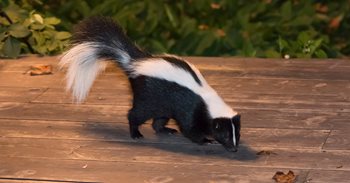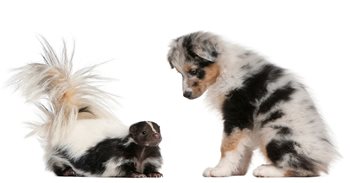How to handle this stinky, inconvenient incident.
Where Do Skunks Live?

Canada is home to two species of skunk. The most common is the Stripped Skunk (like Pepé Le Pew) which can be found across the country and the second is the Spotted Skunk which can be found in the southern British Columbia. Although the Spotted Skunk is slightly smaller than the Stripped Skunk, both are very similar.
Although shy, skunks are very adaptable and show no discrimination when picking a place to live as they can be found in both rural and urban areas as long as they have a nearby source of water. Skunks will either make a new home by using their long claws to dig a den or they will reside in an abandoned den built by another animal, such as a fox. You might also find skunks in aboveground places like in hollow logs, woodpiles, or in brushes. It’s also quite common for skunks to build their homes close to humans underneath porches, houses, garages. A skunk will use grass, hay or leaves to line its home when it lives in a den. A skunk’s den often contains one to three chambers, and there may be up to five entrances, each about eight inches in diameter.
Skunks are omnivores, consuming a vast diet of both plant and animal matter. Skunks are opportunistic eaters, and their diets often shift with the seasons.
Skunks are nocturnal, so they are most active at night. They do not hibernate, but they tend to be inactive during the coldest months in winter and may gather in communal dens for warmth. For the remainder of the year, skunks are generally solitary, living and foraging alone.
Why Do Skunks Spray?
Every Canadian is familiar with a skunk’s pungent method of protection. Most meat-eating mammals have anal glands for the purpose of secreting a potent, oily substance. These scent glands have evolved to fulfil different purposes in different animals, but Skunks are the only mammals who use theirs as a defense mechanism.
When a Skunk sprays, protrusions called papillae come out to shoot the musk at the target. They can spray up to 10 feet and are incredibly precise in hitting their mark.
Skunks only spray when necessary and are reluctant to spray (think of how rarely you hear of a human being sprayed). Adult skunks will give warning signs like hissing, stomping and raising their tails before spraying. The Spotted Skunk will even do a handstand.
What To Do If Your Dog Gets Sprayed
Please note that I am not a veterinarian nor am I a veterinary technician. I am simply an experienced dog owner and this solution has worked for me to get the smell of skunk out of my dogs’ coats. This blog is not intended to be a substitute for professional veterinarian advice, diagnosis, or treatment. Always seek the advice of your veterinarian with any questions you may have regarding the condition of your dog.

Dogs seem to always be very drawn to skunks. I have wondered if it is because they look like a funny moving little dog or cat, if it’s simply because nature has made them stand out so strongly with that white stripe or if the smell of a skunk excites them long before they meet. Regardless, dogs love to investigate skunks and unfortunately do not learn their lesson after being sprayed once. You may think, from our human perspective anyway, that contact with something so awful would leave a mark in a dog’s memory, but from the dog’s perspective, the urge to pursue critters seems to be simply irresistible.
Your well-meaning neighbours might tell us to use tomato juice to get rid of the smell but to anyone who has tried this method will tell you – it takes a whole lot of tomato juice and only masks the smell plus it will dye a light coloured dog’s fur (pink Samoyed anyone?).
Here’s a remedy that I found online years ago that comes from William F. Wood, a chemist at Humboldt State University and I have found to be effective:
a mixture of 1 quart of 3 % Hydrogen Peroxide, ¼ cup of baking soda and 1 to 2 teaspoons of liquid dish soap.
\When combined, hydrogen peroxide and baking soda become a chemical engine to churn out oxygen and the soap will break the oils of the spray and allow the other ingredients to then work.
If weather permits, bathe outdoors as the smell can contaminate areas of your home. Mix up all the ingredients at once and apply to your dog while wearing gloves and being very careful not to get any in your dog's eyes. Apply dry, rub it in and keep on for about 5 minutes. Rinse off and repeat as necessary.
After the bath, check your dog’s eyes. They may have been hit directly and could be very painful. If rinsing them out gently or using fake tear drops doesn’t help, contact your veterinarian.
My Tips
- Do not store any unused portions of the mixture I recommended above in a container as it can explode due to the pressure building up.
- The mixture should be used immediately after mixing to be effective.
- The mixture may lighten a dog's hair.
- Commercial medicated shampoos are available for purchase and I personally keep a bottle in my dog’s travel pack just in case.
- When combined, hydrogen peroxide and baking soda become a chemical engine to churn out oxygen, so it has to be used immediately after being mixed.
- If some spray got on your clothing, wash them in regular detergent with one quarter to half a cup of baking soda depending on the size of the load.
- Check your dog to see if he was bitten by the skunk. Skunks are known carriers of rabies and if your dog has been bitten, you should consult a veterinarian.
- To avoid a spray, keep your dogs on leash after dusk and in the early hours of the morning